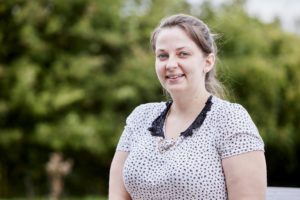Setting a county-wide challenge
Involving multiple partners across the county – from health trusts to charities – in a shared Join Dementia Research challenge, helped to substantially boost recruitment in Lincolnshire around Dementia Awareness Week. Each organisation took on a form of outreach that best played to their strengths, with activity coordinated by Lincolnshire Partnership NHS Foundation Trust (LPFT). Setting an ambitious target acted as a motivation for all organisations to pull together.
Covid-19 has seen many health trusts pull together and support each other, and in Lincolnshire this also led to a stronger partnership over dementia research. When research staff from the mental health trust at LPFT went to help the acute hospitals with running Covid research, LPFT’s Senior Clinical Research Practitioner Anne Chafer spotted an opportunity.
“Working so closely with the research teams really opened new doors and allowed us to see the potential for collaboration in other areas such as dementia,” she says. “That’s when we came up with the idea of the LincsJDR300 Challenge, to get all these teams pulling together. It’s really difficult to achieve a big step up in recruitment through just one Trust, so we had to find willing partners.”
Setting the challenge
The LPFT team came up with the name – LincsJDR300 – which was approved for use by the national Join Dementia Research team and the National Institute for Health Research (NIHR) Clinical Research Network East Midlands (CRN EM) and helped to give the campaign a new and innovative identity. The LincsJDR300 challenge aimed to recruit 300 new volunteers to the Join Dementia Research platform, in particular during the period around Dementia Awareness Week 2021. Given that total recruitment in the county to date is 900, attempting to increase this by a third in just a few months was very ambitious. Nevertheless, the enthusiasm of Anne and her team soon got other partners on board.
The Clinical Commissioning teams in Lincolnshire were particularly supportive and even the Estates

Rachel Fothergill, Care Home in Reach, Clinical Research Practitioner (CRN EM)
Team in LPFT got on board, signing up their staff in the very beginning of the campaign. The campaign team sent out regular updates on numbers of volunteers signed up to everyone involved and used a “Thermo” the thermometer emoji to show how numbers were growing each week. As part of the campaign, Anne and her colleagues, clinical Research Practitioners, Tracey Collishaw and Rachael Fothergill delivered over 500 paper copies of the registration form by hand to homes in Lincolnshire, and maintained a robust social media campaign. The CRN EM supported the campaign in their newsletters giving the work a broader national footprint.
United Lincolnshire Hospitals NHS Trust ran a Twitter campaign, as they had the strongest social media presence.
The local Council also got involved, sending information about JDR to all its teams and LPFT research staff gave presentations about it at a number of meetings with partner organisations.
Even Lincolnshire Wildlife Trust helped out, sending details out to their members. Staff from various other organisations leafletted their local communities too.
Spreading the word
The word was further spread by all the organisations through articles in their internal newsletters and, by the LPFT team, through local blogs and social media channels.
“We grabbed every opportunity we could to raise awareness,” says Rachael Fothergill, who also volunteers for the charity Alzheimer’s Society. “It was a challenging time to run such a campaign, as so many events where we’d normally publicise Join Dementia Research didn’t take place. This made having the partners on board even more important.”
The LincsJDR300 campaign recruited over 100 new volunteers to the platform in its first two months, at a time when recruitment to Join Dementia Research had been static due to the pandemic – a very impressive achievement. But it hasn’t stopped there. The momentum created by the campaign has spurred staff to keep pushing to reach the target, so Join Dementia Research remains high on the agenda in the county.
Lessons learned:
- Create a campaign or challenge which others can sign up to – even if you don’t achieve all your goals, you’ll strengthen partnerships in the process
- Don’t be afraid to approach partner organisations even if they don’t necessarily have a health focus
- Knowing the right people to talk to in each organisation helps to get the partnership established
- Play to each partner’s strengths to make the best use of combined resources
